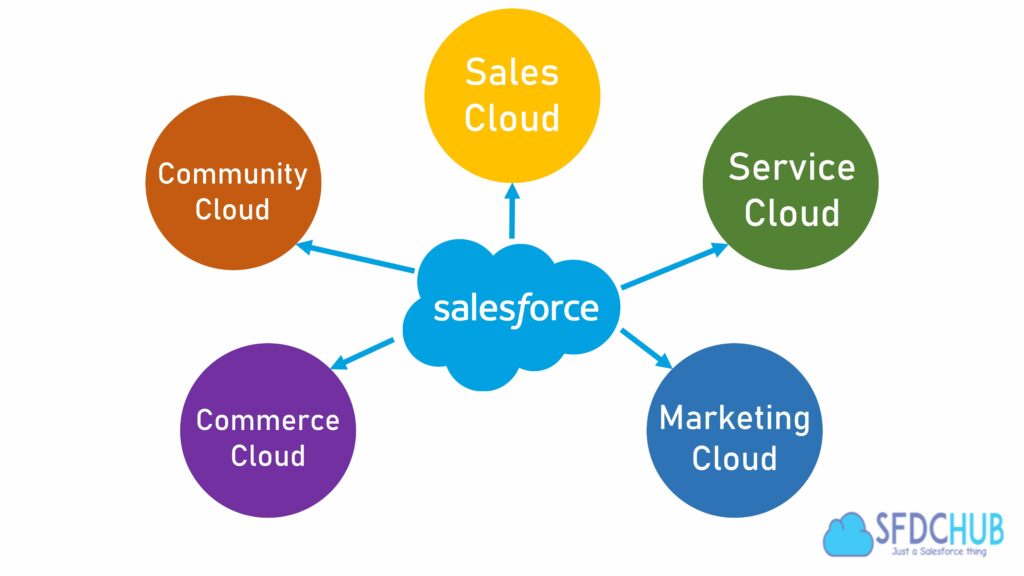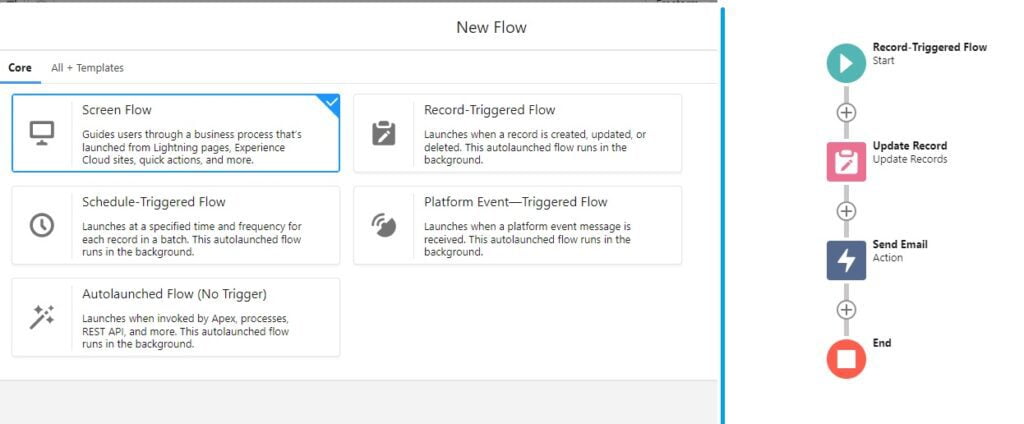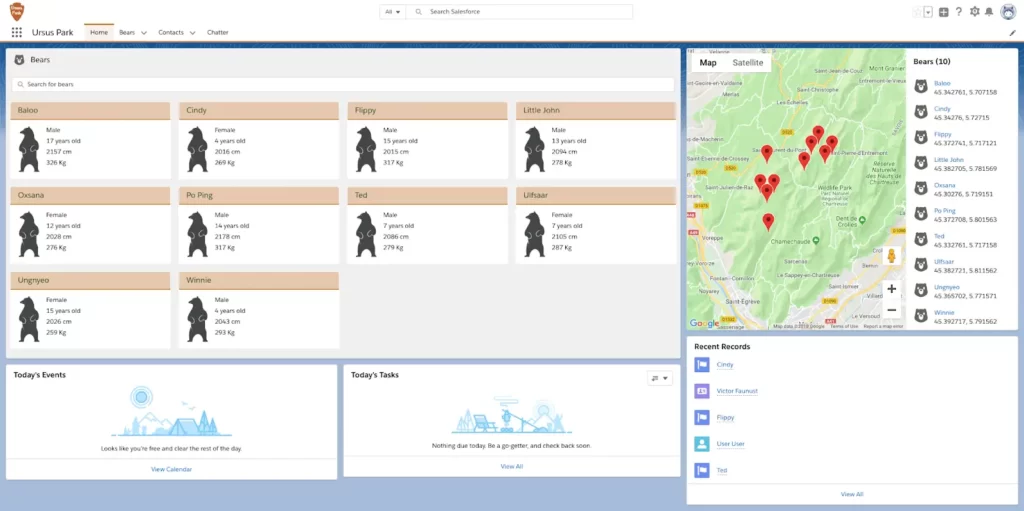When I heard the word “Salesforce” for the first time, I thought its something related to Sales. I was not new. Later I heard it is something drag and drop tool to create a web application. When I actually got into Salesforce, I found it’s far beyond the point and click tool. It is a powerful platform to build web applications and go live. It allows us to focus on business logic and automation.
Let’s understand, what is Salesforce from a Developer’s perspective. So this post will be more oriented towards technical things.
What is Salesforce actually?
Why one should go with Salesforce over the traditional app development process? Salesforce will give you the ability to easily manage the backend and a simpler way of creating frontend components. Salesforce Flows enables a faster way of automation on the platform. Many such reasons, but let’s understand what is Salesforce in 5 simple points.
Choose right type of Cloud for your business requirement

Technically, Salesforce is both SaaS and PaaS. In the traditional development process, we need to finalize the infrastructure requirements depending on the requirements. But in Salesforce, it all starts with choosing the right cloud. Salesforce offers different types of Salesforce cloud as below:
| Cloud Type | Use Case |
| Sales Cloud | To handle the sales process. This helps business to grow their accounts, find new customers, close the deals and get insights into this entire process. |
| Service Cloud | This cloud mainly provides the services such as Call centers, Live chat, Knowledgebase, etc. |
| Marketing Cloud | As the name suggests, it’s used for Marketing. It has all the required functionalities for Marketing, such as Marketing automation, bulk mails, and messages. |
| Commerce Cloud | Capable of collaborating IT solutions for online shopping or related services. It is scalable, maximize productivity with centralized management of orders, store operations, POS, etc |
| Community Cloud | Mainly focused on collaboration. Everyone can build their own community and share the problems, issues, questions, etc. Customers, Clients, Partners, or employees can connect by building their own community. |
Depending on the types of Salesforce Cloud and user license, you will get the functionalities of the Salesforce Platform. At present, Salesforce license cost starts from $25/User. This will eliminate, all of your headaches from choosing the proper hosting for your website to maintaining the infrastructure.
Easy Automation with Salesforce Flows
You can automate the processes easily by using Salesforce Flows. Previously, there were workflows and Process Builders, but they will be deprecated in upcoming releases. Salesforce provides a drag-and-drop interface to automate the logic. Flows can be of different types such as Record triggered flow, Autoluanched Flow, Screen Flow, etc.

Salesforce Flows is just a powerful tool and you can achieve most of using it on the platform. Let’s consider Record Triggered Flow. In short words, you can initiate a flow, when a record is created, updated, or deleted. It can be a set of blocks. These drag and drop blocks can be pre-built or custom ones. Yes, you can create your own. This makes it more powerful and easy to use.
Objects and Classes are Backbone of Backend
If we have to compare, then Salesforce Objects are nothing but Database tables and fields are Database columns. In Salesforce, there are two types of Objects, standard, and custom. Standard objects are prebuilt in Salesforce, and we can not modify some parts of it. There are 100+ standard objects in the Salesforce platform. For custom implementation, we can create Custom Objects as per requirement. These custom objects will be consisting of Custom Fields. Data will be stored in the form of records of these objects. With the lots of tools available within the platform, you can easily process this data as per your requirement.
Even though there is Salesforce Flow for backend automation, not every operation can be carried out using it. We can use Apex Class in such a case. According to Salesforce, Apex is a strongly typed, object-oriented programming language that allows developers to execute flow and transaction control statements on the Lightning platform server in conjunction with calls to the Lightning Platform API.
Build amazing frontend with Lightning Web Components
In the era of themes and templates, Salesforce brought the concepts of Visualforce pages and aura components. After a long time, now Salesforce will deprecate Visualforce pages. Aura components will be also deprecated in near future.

Now, Salesforce is coming up with new Lightning Web Components commonly known as LWC. These components are javascript-based components where Apex is used at the backend. These components are really easy to create. These are capable of creating powerful web components. We can utilize Salesforce Lightning Component Library for different pre-built components.
Manage security with Permission Sets, Roles and Profiles
Nowadays, we have different MVC-based web frameworks, which made Web app development easy. It provides a set of some pre-built modules, which we can use securely. Even though it will be a pre-built set of code that we can re-use, still complicated when lots of roles and profiles come into the picture.
Salesforce made this part very easy and more solid. With a simple structure of Permission Sets, Roles and profiles, you can give customized access up to field level. We can group the user on the basis of permissions, they should have. A role defines what user data a user can see based on a hierarchy whereas a Profile defines permissions. Permission Set allows users to get extra permissions.
Built in API for easy integration
Salesforce will provide programmatic access to your org with a simple, powerful, and secure API structure. Unlike traditional development, where we need to write code for APIs, Salesforce has it inbuilt. In fact, Salesforce provides almost 10 types of APIs to deal with the data in your Salesforce Org.
| Salesforce API Type | API Purpose |
| REST API | Access objects in your organization |
| SOAP API | Integrate your organization’s data with other applications |
| Bulk API | Load or delete large numbers of records |
| Metadata API | Manage customizations in your org also used for deployments of components and for CI/CD pipelines. |
| Tooling API | Build custom development tools for Force.com applications |
| Chatter REST API | Access Chatter feeds and social data |
| Streaming API | Provide a stream of data reflecting data changes in an organization |
| Apex SOAP API | Create custom SOAP Web services in Apex. |
| Apex REST API | Build your own REST API in Apex |
| Data.com API | Access the most up-to-date contact and account information. |
Free of cost learning with Hands-on org
Trailhead is the Fun Way to Learn Salesforce. Though Salesforce is extensive, it is not difficult to learn. Trailhead provides lots of free study material to study the Salesforce. The structure of Trailhead is really interesting. It has Modules, Trails, and Superbadges, which makes learning Salesforce more interesting.
Each module is consists of one or multiple sub-modules. Upon completion of a module, you will get a badge and some points. After completion of relevant modules, you will unlock Superbadges. Superbadges will be more challenging than simple modules. Such multiple modules and Superbadges will make a Trail. And such different trails will make Trailmixes. For example, Salesforce Admin Trailmix will consist of modules and Superbadges related is Salesforce Administrator essentials.
Admin Trail gives you a better and in-depth idea about What is Salesforce actually.
Abhishek
Mr. Abhishek, an experienced Senior Salesforce Developer with over 3.5+ years of development experience and 6x Salesforce Certified. His expertise is in Salesforce Development, including Lightning Web Components, Apex Programming, and Flow has led him to create his blog, SFDC Hub.




This article is very useful to understand what exactly salesforce is. Thanks for sharing.